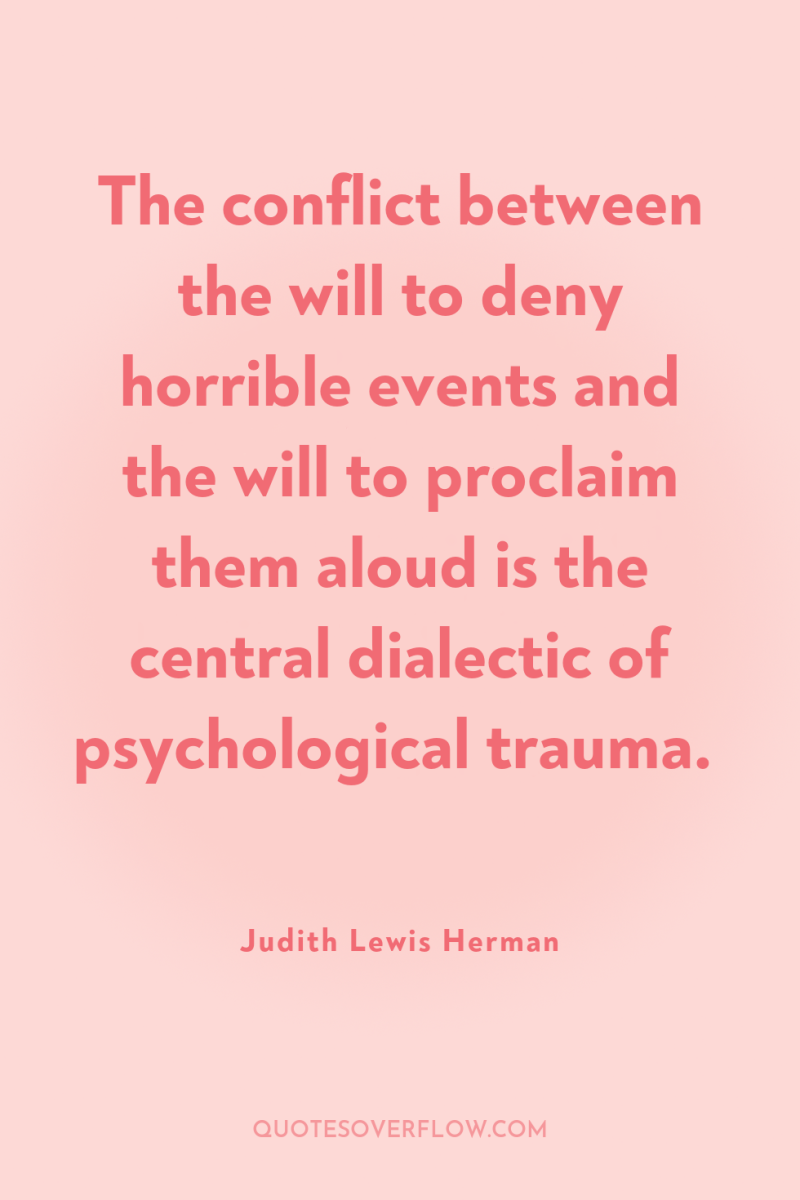
1
The conflict between the will to deny horrible events and the will to proclaim them aloud is the central dialectic of psychological trauma.Judith Lewis Herman
2
The ORDINARY RESPONSE TO ATROCITIES is to banish them from consciousness. Certain violations of the social compact are too terrible to utter aloud: this is the meaning of the word unspeakable. Atrocities, however, refuse to be buried. Equally as powerful as the desire to deny atrocities is the conviction that denial does not work. Folk wisdom is filled with ghosts who refuse to rest in their graves until their stories are told. Murder will out. Remembering and telling the truth about terrible events are prerequisites both for the restoration of the social order and for the healing of individual victims. The conflict between the will to deny horrible events and the will to proclaim them aloud is the central dialectic of psychological trauma. People who have survived atrocities often tell their stories in a highly emotional, contradictory, and fragmented manner that undermines their credibility and thereby serves the twin imperatives of truth-telling and secrecy. When the truth is finally recognized, survivors can begin their recovery. But far too often secrecy prevails, and the story of the traumatic event surfaces not as a verbal narrative but as a symptom. The psychological distress symptoms of traumatized people simultaneously call attention to the existence of an unspeakable secret and deflect attention from it. This is most apparent in the way traumatized people alternate between feeling numb and reliving the event. The dialectic of trauma gives rise to complicated, sometimes uncanny alterations of consciousness, which George Orwell, one of the committed truth-tellers of our century, called "doublethink, " and which mental health professionals, searching for calm, precise language, call "dissociation." It results in protean, dramatic, and often bizarre symptoms of hysteria which Freud recognized a century ago as disguised communications about sexual abuse in childhood..Judith Lewis Herman
3
Today I wore a pair of faded old jeans and a plain grey baggy shirt. I hadn't even taken a shower, and I did not put on an ounce of makeup. I grabbed a worn out black oversized jacket to cover myself with even though it is warm outside. I have made conscious decisions lately to look like less of what I felt a male would want to see. I want to disappear.Sierra D. Waters
4
Whether it’s an Iraqi widow mourning her dead loved ones standing helplessly in the rubble of her former home or a dying soldier in an Iraqi city street asking, “Why, God? Why is this happening? Where are you?” I can’t help but wonder the same. You realize that there is no justice, no karmic retribution swift enough, and that happy endings are a terrible, terrible lie. We are all subject to the same blind boot stomp and our luck is merely where we happen to be standing when death inevitably comes roaring down upon us.M.B. Dallocchio
5
We are threatened with suffering from three directions: from our body, which is doomed to decay..., from the external world which may rage against us with overwhelming and merciless force of destruction, and finally from our relations with other men... This last source is perhaps more painful to use than any other. (p77)Sigmund Freud

6
If the sound of happy children is grating on your ears, I don't think it's the children who need to be adjusted.Stefan Molyneux
7
PTSD is a whole-body tragedy, an integral human event of enormous proportions with massive repercussions.Susan Pease Banitt
8
BEFRIENDING THE BODY Trauma victims cannot recover until they become familiar with and befriend the sensations in their bodies. Being frightened means that you live in a body that is always on guard. Angry people live in angry bodies. The bodies of child-abuse victims are tense and defensive until they find a way to relax and feel safe. In order to change, people need to become aware of their sensations and the way that their bodies interact with the world around them. Physical self-awareness is the first step in releasing the tyranny of the past. In my practice I begin the process by helping my patients to first notice and then describe the feelings in their bodies–not emotions such as anger or anxiety or fear but the physical sensations beneath the emotions: pressure, heat, muscular tension, tingling, caving in, feeling hollow, and so on. I also work on identifying the sensations associated with relaxation or pleasure. I help them become aware of their breath, their gestures and movements. All too often, however, drugs such as Abilify, Zyprexa, and Seroquel, are prescribed instead of teaching people the skills to deal with such distressing physical reactions. Of course, medications only blunt sensations and do nothing to resolve them or transform them from toxic agents into allies. The mind needs to be reeducated to feel physical sensations, and the body needs to be helped to tolerate and enjoy the comforts of touch. Individuals who lack emotional awareness are able, with practice, to connect their physical sensations to psychological events. Then they can slowly reconnect with themselves.Unknown
9
This book is a memoir - not of specific life events, but of the processes of dissociation, and of re-enlivening emotions that are shameful to admit or even to feel. It is an account of the altered states that trauma induces, which make it possible to survive a life-threatening event but impair the capacity to feel fear, and worse still, impair the ability to love. (292)Jessica Stern
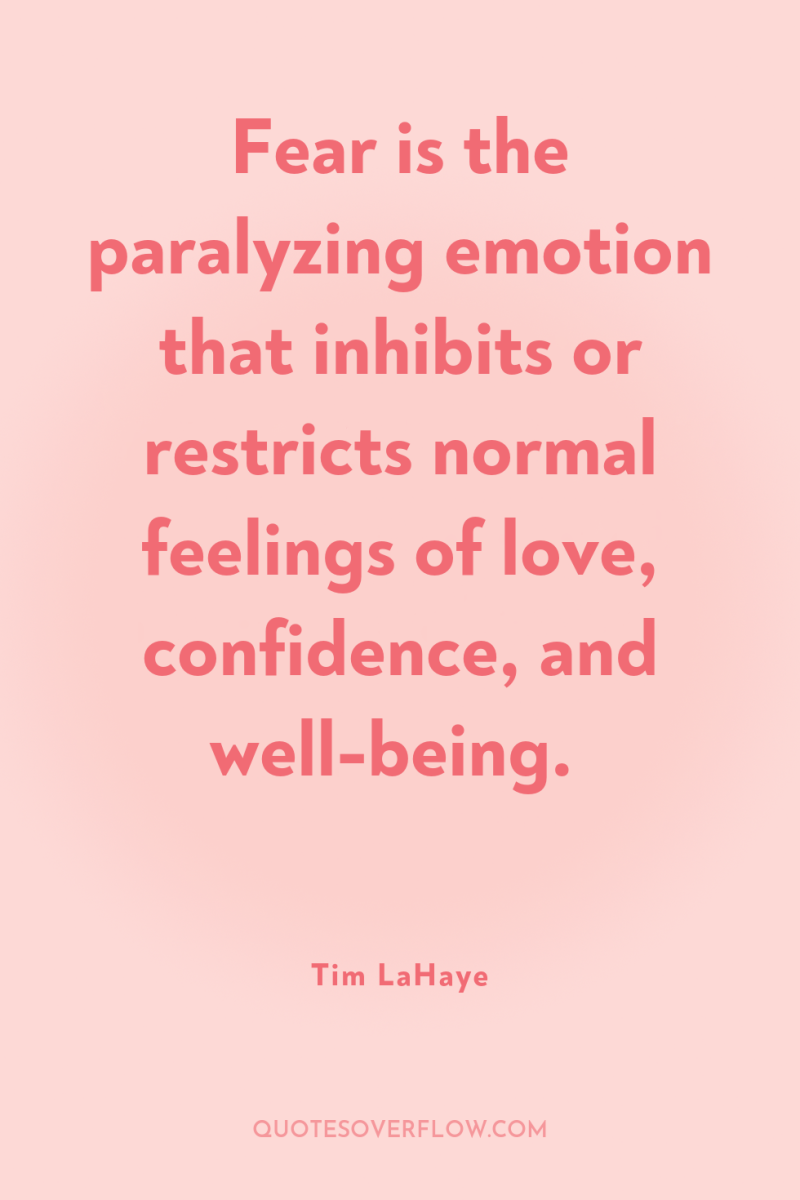
10
Fear is the paralyzing emotion that inhibits or restricts normal feelings of love, confidence, and well-being.Tim LaHaye
11
By processing information from the environment through the senses, the nervous system continually evaluates risk. I have coined the term neuroception to describe how neural circuitsdistinguish whether situations or people are safe, dangerous, or life-threatening. Because of our heritage as a species, neuroception takes place in primitive parts of the brain, without our conscious awareness.Stephen W. Porges
12
A child's (or an adult's) nervous system may detect danger or a threat to life when the child enters a new environment or meets a strange person. Cognitively, there is no reason for them to be frightened. But often, even if they understand this, their bodies betray them. Sometimes this betrayal is private; only they are aware that their hearts are beating fast and contracting with such force that they start to sway. For others, the responses are more overt. They may tremble. Their faces may flush, or perspiration may pour from their hands and forehead. Still others may become pale and dizzy and feel precipitously faint.Stephen W. Porges
13
We are Craiglockhart's success stories. Look at us. We don't remember, we don't feel, we don't think - at least beyond the confines of what's needed to do the job. By any proper civilized standard (but what does that mean now?) we are objects of horror. But our nerves are completely steady. And we are still alive.Pat Barker
14
As a civilian, I know nothing about combat, the Marine Corps experience or modern man's struggle adjusting to peace after war. I only know what's been shared with me; confidences I would never betray, nor use as details in a novel.Tiffany Madison
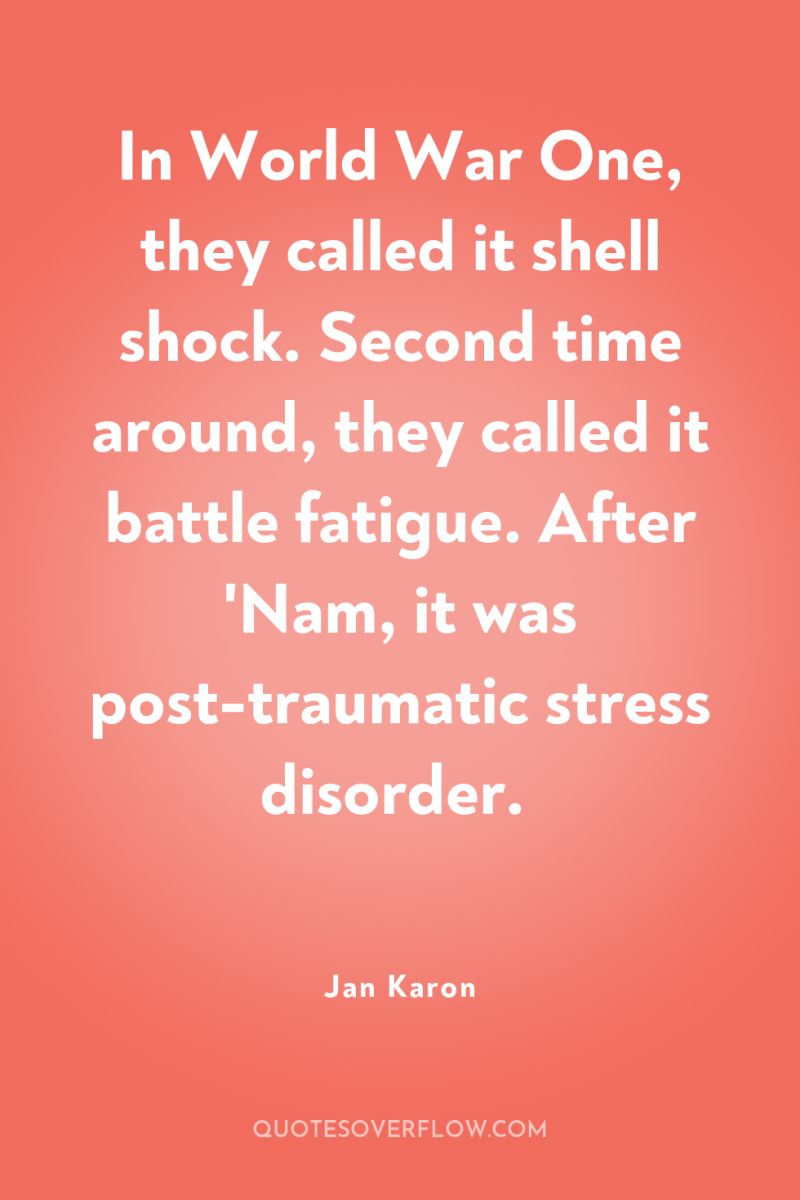
15
In World War One, they called it shell shock. Second time around, they called it battle fatigue. After 'Nam, it was post-traumatic stress disorder.Jan Karon

16
A wave of saudade swept over me as I realized home never existed at all. The concept of home felt far from my reach, and I felt sick with longing.M.B. Dallocchio

17
Adversity has the remarkable ability of introducing the real you to yourself.M.B. Dallocchio
18
There are people who come home from war and want to talk about the pain, but no one wants to listen; there are others who want to keep silent and repress the memories, and all their family and friends want is to talk about it. I call this the war veteran reintegration paradox.M.B. Dallocchio

19
I left a piece of my soul that will always rightfully belong in the desert.M.B. Dallocchio
20
In movies, war only looks romantic. “Tell my gal I love her…” close-up shot, and fade out. It doesn’t work as beautifully and neat in real life. Flying chunks of human flesh and screaming orphans really put that Hollywood take into perspective and there is nothing clean or sterile about any of it. When people die, it’s fucking horrible.M.B. Dallocchio
21
Aside from clinically-diagnosed psychopaths, I have not met one person in war who thoroughly enjoyed killing. If someone ended up bragging over a kill, it was safe to assume that their story was mere fabrication or that they were one bad day away from an inpatient psychiatric ward. No matter how much someone may appear to deserve to be killed, something dies within us when we kill. It's contradictory, the antithesis of our species survival instinct. .M.B. Dallocchio
22
Veterans being sent into unjust wars for corporate profit is a perversion of trust, at best. I found the emotional manipulation of both sides, the propaganda at play so incredibly revolting that I couldn't stand to idly wave a flag or flaunt yellow ribbons without asking serious questions regarding motive.M.B. Dallocchio
23
A woman in combat? Yes. Since when? Since Native American warrior Buffalo Calf Road Woman knocked that prick General George Custer off of his horse. Since Pantea Arteshbod propelled herself to become one of the greatest Persian commanders during the reign of Cyrus the Great. Since Hua Mulan disguised herself as a male to engage in combat and became one of China’s most respected heroines.M.B. Dallocchio
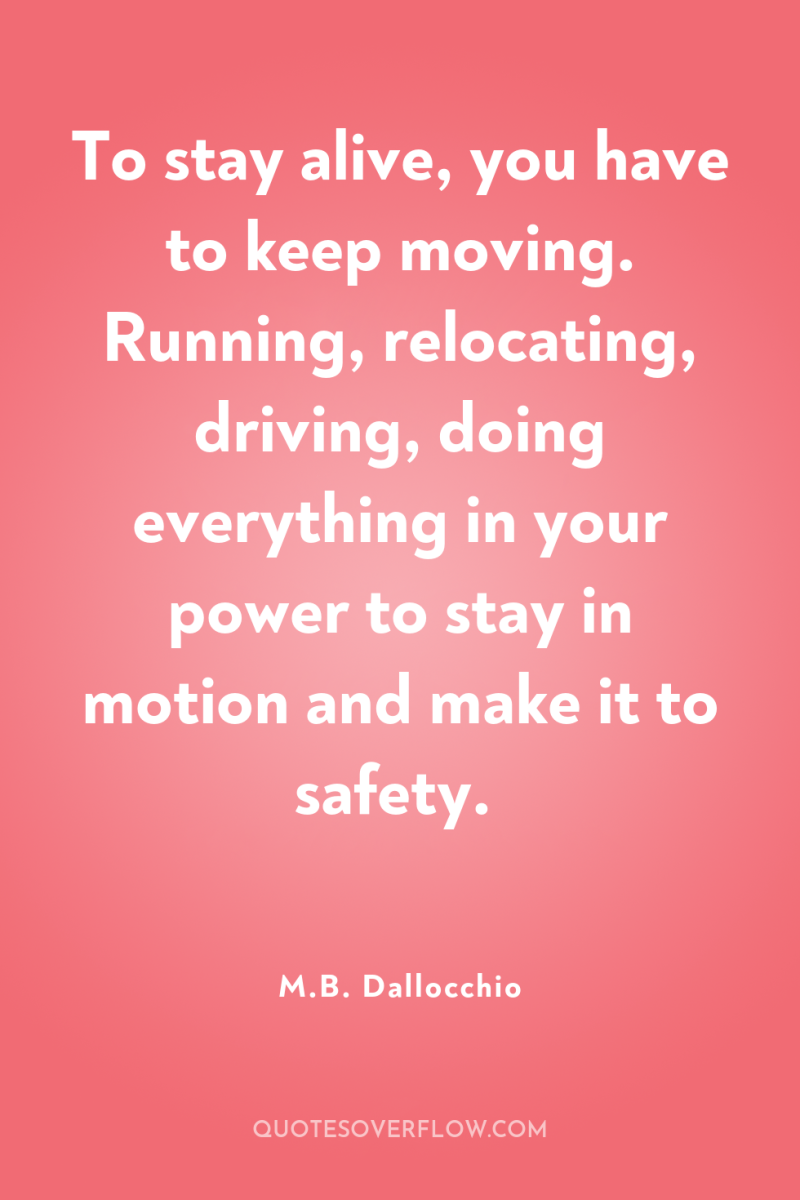
24
To stay alive, you have to keep moving. Running, relocating, driving, doing everything in your power to stay in motion and make it to safety.M.B. Dallocchio
25
A moving target is harder to kill, and I didn't stop running, maneuvering, until I reached home base, where I could breathe between death-defying sprints. I just need to make it home alive, and this will all be over, I told myself. Home.M.B. Dallocchio
26
A siege is always a hospital - a hospital where mad thoughts abound and where mad things are done; where, under the stimulus of an unnatural excitement, new beings are evolved, beings who, while having the outward shape of their former selves, and, indeed, most of the old outward characteristics, are yet reborn in some subtle way and are no longer the same.. The salt of life! Is it true, or is it merely a mistake, such as life-loving man naturally makes? For it can be nothing but the salt of death which has lain for a brief instant on the tongue of every soldier - a revolting salt which the soldier refuses to swallow and only is compelled to with strange cries and demon-like mutterings. Sometimes, poor mortal, all his struggles and his oaths are in vain. The dread salt is forced down his throat and he dies. The very fortunate have only an acrid taste which defines analysis left them. Of these more fortunate there are, however, many classes. Some, because they are neurotic or have some hereditary taint, the existence of which they have never suspected, in the end succumb; others do not entirely succumb but carry traces to their graves; yet others do not appear to mind at all. It is a very subtle poison, which may lie hidden in the blood for many months and years. I believe it is a terrible thing.. And yet even this nobody understands or cares to speak of.. Englishmen are proud, and want to know if you were inside the British Legation, their Legation, and when they have heard yes or no their interest ceases. They little know what the Legation stood for. The Americans march up to the Tartar Wall, talk about "Uncle Sam's boys, " and exclaim that it requires no guessing to tell who saved the Legations. The French are the same, so are the Germans, so even the Italians. Only the Japanese and the Russians say nothing.. I am, therefore, tired of it all, inexpressibly tired. I wish to escape from my hospital, to go away to some clean land where they understand so little of such things that their indifference will in the end, perhaps, convince me and make me forget. Yet can one ever forget? .B.L. Putnam Weale
27
Telling my story was supposed to be a good thing but it had just made everything worse.Unknown
28
I was so tired of his being even-keeled in the face of all that was upsetting and ugly and illogical.Unknown
29
I do not think the long-range bullets I fire provide the mark of a man; I am only dimly aware that they are dehumanising me. They are my opium tto see me through my time here. But with each hit they give, they only provide a feeling respite from the past I cannot escape from and thre present I have chosen to mire myself in. And, grounded as I am in the reality of this hill, I do not yet fully appreciate how this addiction is infecting my future with malediction. With this clinical, psychopathically detached behaviour considered as normal, proper and expected on this hall, I cannot yet stop to think - because I cannot allow myself to here - of how hese respites may be blackening my soul in all the time I will have left on my own back Home - should I even live through the remainder of my months here, in some other corner of this Hell of a country.Jake Wood
30
I knew that these people on their way to work or home or dinner had no idea what it was they were supporting. They did not have a clue as to what war was like. What it made people see, and what it made them do to each other. I felt as though I didn't deserve their support, or anyone's, for what I had done. No one should ever support the activities in which I had participated. No one should ever support the people who do such things. (..) They were uninformed but good people. The kind whose respect we would welcome if it was based upon something true. It was when we were around them that we had to hide the actual truth most consciously. It wasn't enough to not mention the war or being a veteran, because they'd bring it up. The civilians we were most anxious around, and therefore tended the most to avoid, were exactly those good citizens who thought they were helping us.Jessica Goodell
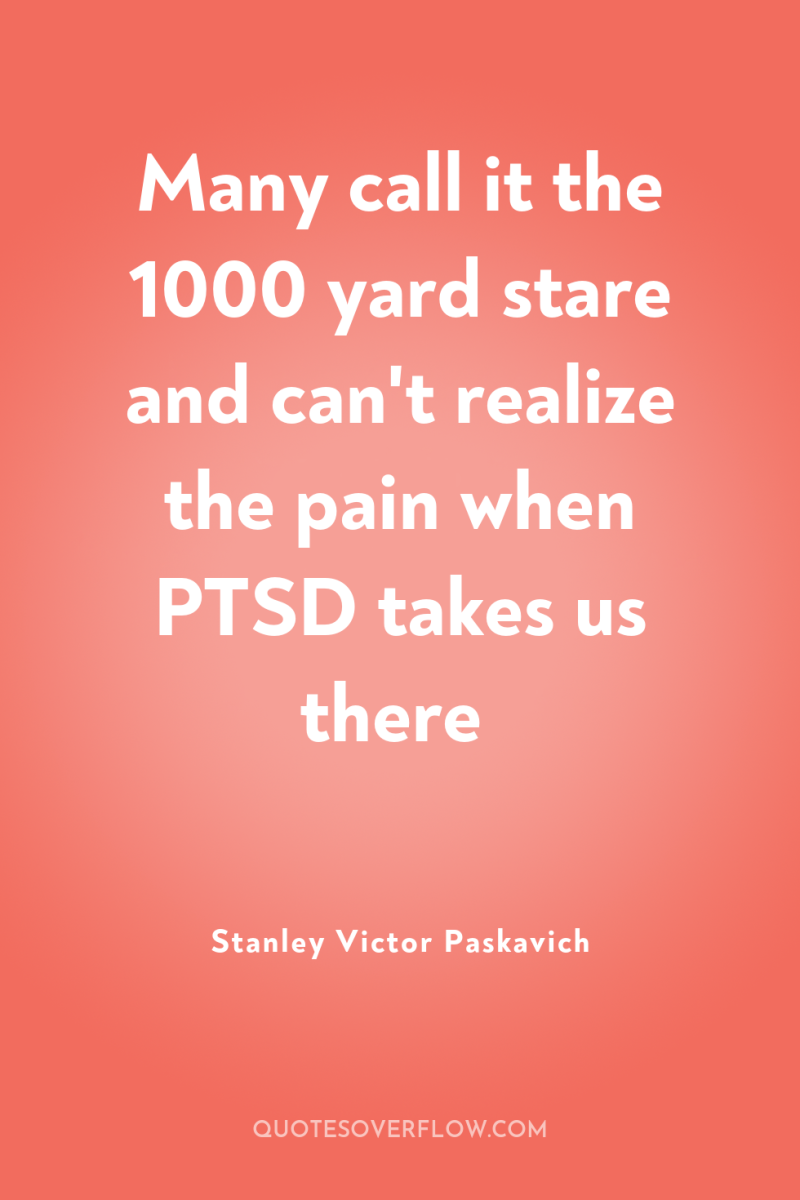
31
Many call it the 1000 yard stare and can't realize the pain when PTSD takes us thereStanley Victor Paskavich
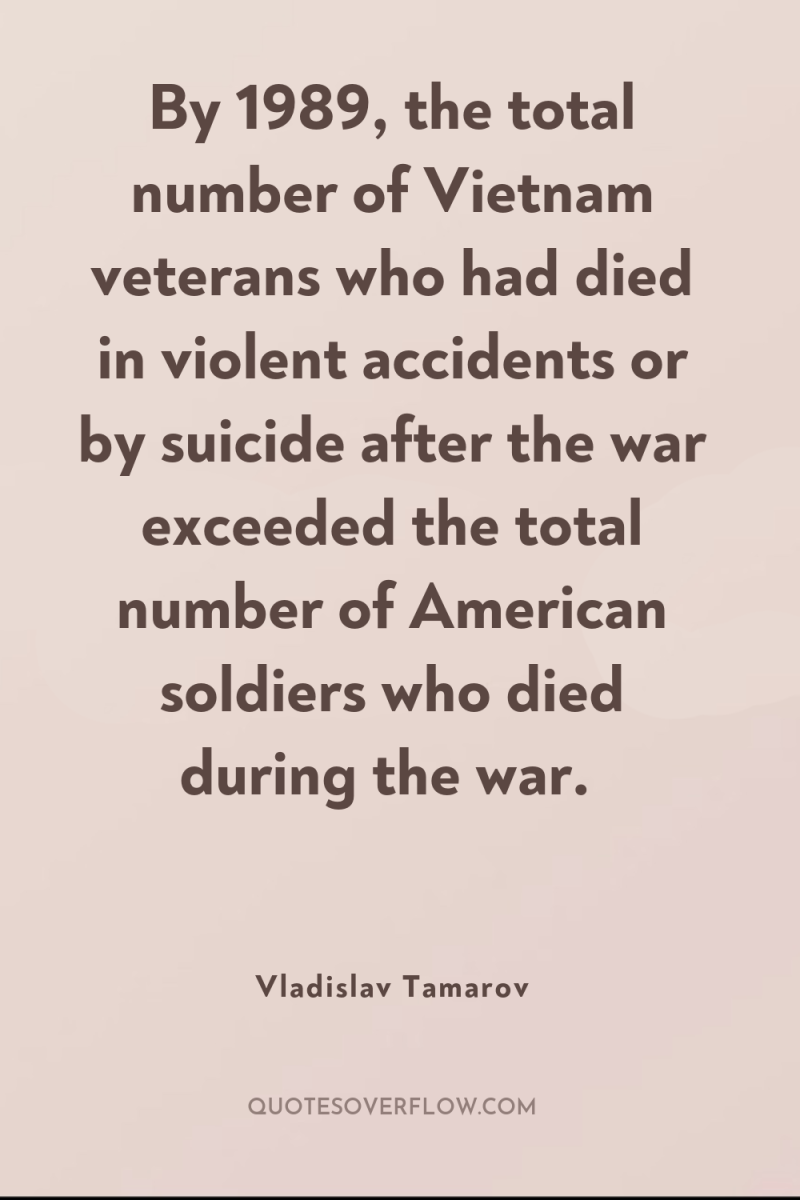
32
By 1989, the total number of Vietnam veterans who had died in violent accidents or by suicide after the war exceeded the total number of American soldiers who died during the war.Vladislav Tamarov
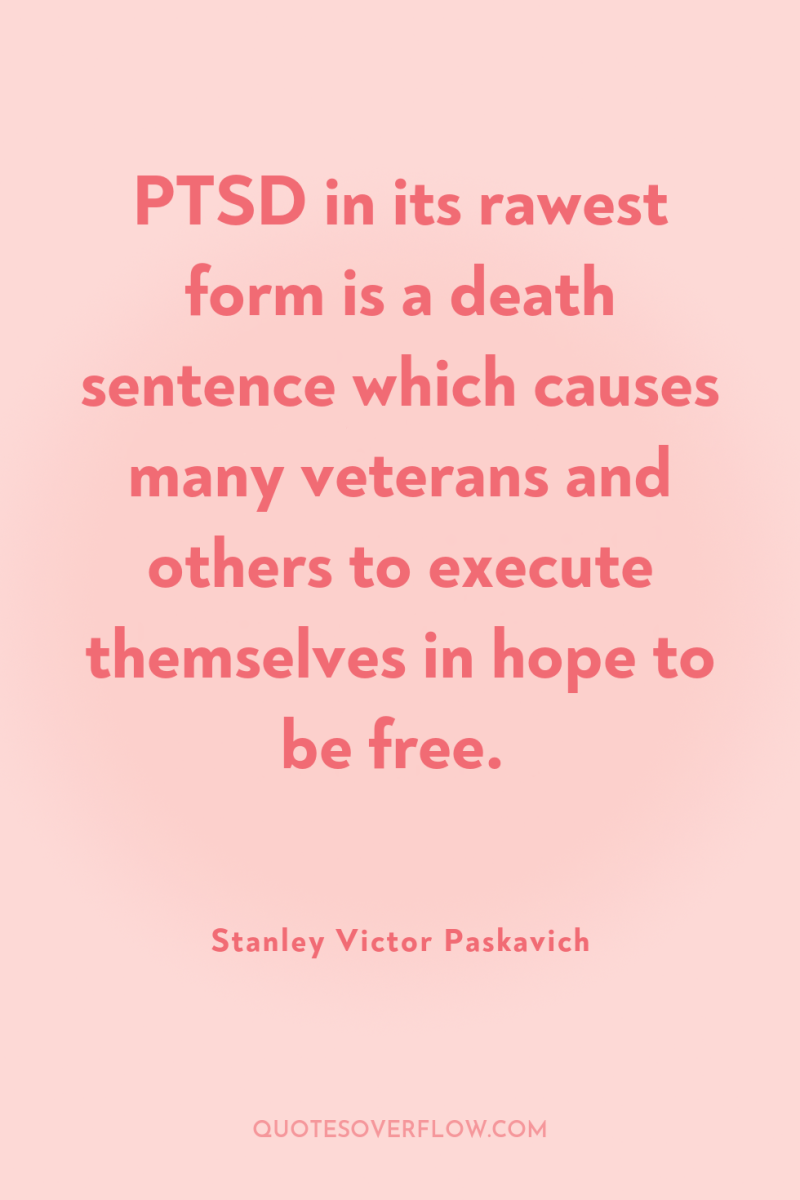
33
PTSD in its rawest form is a death sentence which causes many veterans and others to execute themselves in hope to be free.Stanley Victor Paskavich
34
What was it like? Hell if I know. But next time someone asks.... I'll answer crooked, and I'll answer long. And when they get confused or angry, I'll smile. Finally, I'll think. Someone who understands.Matt Gallagher

35
Worry only about what you control. The rest is war.Matthew J. Hefti

36
You play those dimples like an exquisite orchestra, Mr. Boomer.Grace Willows
37
Trauma is personal. It does not disappear if it is not validated. When it is ignored or invalidated the silent screams continue internally heard only by the one held captive. When someone enters the pain and hears the screams healing can begin.Danielle Bernock
38
My wife is alone in our full bed too. Her husband, the father of her children, never came back from Iraq. When I deployed the first time she asked her grandmother for advice. Her grandfather served in Africa and Europe in World War II. Her grandmother would know what to do.“ How do I live with him being gone? How do I help him when he comes home?” my wife asked. “He won’t come home, ” her grandmother answered. “The war will kill him one way or the other. I hope for you that he dies while he is there. Otherwise the war will kill him at home. With you.” My wife’s grandfather died of a heart attack on the living-room floor, long before she was born. It took a decade or two for World War II to kill him. When would my war kill me? .Brian Castner
39
But the shock wears off, more quickly for some, but eventually for most. Fast food and alcohol are seductive, and I didn’t fight too hard. Your old routine is easy to fall back into, preferences and tastes return. It’s not hard to be a fussy, overstuffed American. After a couple of months, home is no longer foreign, and you are free to resume your old life. I thought I did. Resume my old life, that is. I was wrong.Brian Castner
40
Traumatic events destroy the sustaining bonds between individual and community. Those who have survived learn that their sense of self, of worth, of humanity, depends upon a feeling of connection with others. The solidarity of a group provides the strongest protection against terror and despair, and the strongest antidote to traumatic experience. Trauma isolates; the group re-creates a sense of belonging. Trauma shames and stigmatizes; the group bears witness and affirms. Trauma degrades the victim; the group exalts her. Trauma dehumanizes the victim; the group restores her humanity. Repeatedly in the testimony of survivors there comes a moment when a sense of connection is restored by another person’s unaffected display of generosity. Something in herself that the victim believes to be irretrievably destroyed---faith, decency, courage---is reawakened by an example of common altruism. Mirrored in the actions of others, the survivor recognizes and reclaims a lost part of herself. At that moment, the survivor begins to rejoin the human commonality..Judith Lewis Herman
41
When I'm triggered, I think, "This will last forever" or "What if this lasts forever?" I get thoughts about how I should give up, run away, hide, protect myself. These thoughts, I cannot change. What I can change is how I respond to them. Will I unconditionally believe these ideas, or will I accept them as side effects of the temporary experience of pain? Will I act on each thought that arises in the burning fire, or will I hold myself gently and say, "It'll be okay. I know it hurts. I love you"? My power lies in these choices.Vironika Tugaleva
42
SE Self Execution the act will always be greater than the pain.Stanley Victor Paskavich
43
When it comes to mental illness most of the diagnoses are similar or the same yet they can never display how we individually go through our pain.Stanley Victor Paskavich
44
When you have mental illness it's common to be shunned by your family or friends it wouldn't happen if they knew the pain you were in.Stanley Victor Paskavich
45
The medical professionals should fight PTSD at every cost for those living in pain and the battles they've lost.Stanley Victor Paskavich
46
Victims are members of society whose problems represent the memory of suffering, rage, and pain in a world that longs to forget.Unknown
47
I'm Bipolar with PTSD there's no shortage of pain inside of meStanley Victor Paskavich
48
Rose lived the same life I did, but she doesn’t have PTSD. No bad dreams, no missing memories. Sometimes I’m jealous that she seems to deal with everything better than I do. But then I’ll catch her with this hollow look in her eyes and think maybe she just disguises everything for my benefit. Maybe she’s broken on the inside too.Paula Stokes
49
Their manipulation is psychological and emotionally devastating — and very dangerous, especially considering the brain circuitry for emotional and physical pain are one and the same (Kross, 2011). What a victim feels when they are punched in the stomach can be similar to the pain a victim feels when they are verbally and emotionally abused, and the effects of narcissistic abuse can be crippling and long-lasting, even resulting in symptoms of PTSD or Complex PTSD.Shahida Arabi
50
As a deep wound comes to the surface, things can appear worse for a time.Renae A.Sauter
51
You’ve got to reach bedrock to become depressed enough before you are forced to accept the reality and enormity of the problem.Jonathan Harnisch
52
Lose yourself in the music, not the fogKeeper Peace
53
Intimidated, old traumas triggered, and fearing for my safety, I did what I felt I needed to do.Sierra D. Waters
54
John was still making comments regarding violent things that he shouldn't, but I hoped he was just being a big mouth. Nobody was going to listen to me anyway.Sierra D. Waters
55
He told me that if I hung up, he'd do it. He would commit suicide. He told me that if I called the cops he would kill every single one of them and I knew that he had the potential and the means to do itSierra D. Waters
56
No amount of me trying to explain myself was doing any good. I didn't even know what was going on inside of me, so how could I have explained it to them?Sierra D. Waters
57
It is not a single crime when a child is photographed while sexually assaulted (raped.) It is a life time crime that should have life time punishments attached to it. If the surviving child is, more often than not, going to suffer for life for the crime(s) committed against them, shouldn't the pedophiles suffer just as long? If it often takes decades for survivors to come to terms with exactly how much damage was caused to them, why are there time limits for prosecution? .Sierra D. Waters
58
The story of my birth that my mother told me went like this: "When you were coming out I wasn't ready yet and neither was the nurse. The nurse tried to push you back in, but I shit on the table and when you came out, you landed in my shit." If there ever was a way to sum things up, the story of my birth was it.Sierra D. Waters
59
The Bad-Moon Girls appear on days when Dad doesn't know what he is thinking, or even if he is thinking. Those days can weigh less than air or more than an ocean. He has blank thoughts without feelings, followed by heavy feelings without thoughts. Time means nothing. A minute ticks by in the same rhythm as an entire day. He can look at one thing for an hour without moving. He can see me or Victor without knowing we are in the room, peering at us as if we are underwater, moving in warped slow motion. After the nothingness, he wades through a stagnant lake with the moon reflected in it, waiting for the daylight to rinse it away. He almost drowns while time ticks on. The sky is filled with black milk. No stars. Two days can pass before he surfaces. Dad's brain-switch, the focusing thing the rest of us switch on to make things look better, is a bit buggered. Those are his words, not mine. The Bad-Moon Girls whisper evil in Dad's ear, the sort of women who would set their own mother on fire if there were no other way to light their cigarettes. The trouble is, they can follow. Just as we were setting off to Clacton last autumn, they hunted him down.Joanna Campbell
60
Since her time in the necromancer’s clutches, she was still recovering lost memories from the quicksand of her mind. They’d drop like nuclear bombs, freezing her at the worst time as visuals which should’ve stayed forever buried bubbled to the surface.Katherine McIntyre
61
The Crazy feeling builds and builds. It never stops, it never ends, there is no relief.Brian Castner
62
Peace surfaced here. Hard to imagine a person finding peace through war, but no one finds peace in war–peace finds you. It crawls into your sleeping bag and helps you fall asleep, nudges your arm, tells you to turn over, think about home.Clint Van Winkle
63
The inability to get something out of your head is a signal that shouts, “Don’t forget to deal with this! ” As long as you experience fear or pain with a memory or flashback, there is a lie attached that needs to be confronted. In each healing step, there is a truth to be gathered and a lie to discard.Christina Enevoldsen
64
In response to threat and injury, animals, including humans, execute biologically based, non-conscious action patterns that prepare them to meet the threat and defend themselves. The very structure of trauma, including activation, dissociation and freezing are based on the evolution of survival behaviors. When threatened or injured, all animals draw from a "library" of possible responses. We orient, dodge, duck, stiffen, brace, retract, fight, flee, freeze, collapse, etc. All of these coordinated responses are somatically based- they are things that the body does to protect and defend itself. It is when these orienting and defending responses are overwhelmed that we see trauma. The bodies of traumatized people portray "snapshots" of their unsuccessful attempts to defend themselves in the face of threat and injury. Trauma is a highly activated incomplete biological response to threat, frozen in time. For example, when we prepare to fight or to flee, muscles throughout our entire body are tensed in specific patterns of high energy readiness. When we are unable to complete the appropriate actions, we fail to discharge the tremendous energy generated by our survival preparations. This energy becomes fixed in specific patterns of neuromuscular readiness. The person then stays in a state of acute and then chronic arousal and dysfunction in the central nervous system. Traumatized people are not suffering from a disease in the normal sense of the word- they have become stuck in an aroused state. It is difficult if not impossible to function normally under these circumstances.Peter A. Levine
65
So, what role does memory play in the understanding and treatment of trauma? There is a form of implicit memory that is profoundly unconscious and forms the basis for the imprint trauma leaves on the body/mind. The type of memory utilized in learning most physical activities (walking, riding a bike, skiing, etc.) is a form of implicit memory called procedural memory. Procedural or "body memories" are learned sequences of coordinated "motor acts" chained together into meaningful actions. You may not remember explicitly how and when you learned them, but, at the appropriate moment, they are (implicitly) "recalled" and mobilized (acted out) simultaneously. These memories (action patterns) are formed and orchestrated largely by involuntary structures in the cerebellum and basal ganglia. When a person is exposed to overwhelming stress, threat or injury, they develop a procedural memory. Trauma occurs when these implicit procedures are not neutralized. The failure to restore homeostasis is at the basis for the maladaptive and debilitating symptoms of trauma.Peter A. Levine
66
One of the paradoxical and transformative aspects of implicit traumatic memory is that once it is accessed in a resourced way (through the felt sense), it, by its very nature, changes. Out of the shattered fragments of her deeply injured psyche, Jody discovered and nurtured a nascent, emergent self. From the ashes of the frantically activated, hypervigilant, frozen, traumatized girl of twenty-five years ago, Jody began to reorient to a new, less threatening world. Gradually she shaped into a more fluid, resilient, woman, coming to terms with the felt capacity to fiercely defend herself when necessary, and to surrender in quiet ecstasy. .Peter A. Levine
67
What is…” She flipped through a few pages, looked up into his eyes. “Is this…?” “My journal, ” he said, reaching out to glide a knuckle down her cheek. Her skin was so damn soft. She was a contradiction in terms to him, and one that he found endlessly fascinating: a woman with the inner strength to rival any Spec Ops member he’d ever known, yet she had such a kind, soft heart beneath that hard-won armor. Resilient. Independent yet willing to compromise. Formidable in her confidence and strength of will, yet gentle and loving. He loved her so hard it hurt. “I bought it the night after you stayed at my place, ” he continued. “I knew if I was going to have a real shot with you going forward then I needed to get my shit together once and for all. You said the writing thing really helped you so I called my counselor and talked to her about it. She thought it would be good for me too. So I wrote in it every day since. I’ve been working hard at it.” Taya leafed through the pages until she came to the end and looked back up into his eyes. “It’s full.” “Yeah. Guess I had a lot to say.” The tenderness in her eyes slayed him. “Nathan, I’m so proud of you.” Her pride in him made him feel twenty feet tall. He let out a relieved breath. “I want to read it to you. That’s my next step, if you’re okay with it.” “Of course it’s okay. I’d love for you to read it to me, as long as you feel comfortable doing it.” “That’s the thing, I am. And I wouldn’t be with anyone else except you. You make me feel…whole.” He didn’t know how else to say it, how else to explain himself, except he needed her to know he was trying like hell to deal with his issues. “I know I’ve got a long way to go before I get to the same place you’re at, but I’m willing to put in the work to get there. I feel safe with you and I’m ready to move forward, let go of all the stuff that happened before. Like you said, I’m doing it for me. I’m sick of my past having any kind of hold over me. So I’m going to do whatever it takes to make peace with it.” Her answering smile lit up her whole face, made her gray eyes sparkle like gems. “Then I’ll gladly listen to whatever you want to say.” Warmth kindled in his chest. She did that; warmed him from the inside out, just by being her. “Good, because I love you.” She froze, her eyes widening slightly. He nodded, laughed at her shocked expression. “Yep, I love you. That’s what I came here to say. I love you and I’m a better man because of it, but not as good a man as I’ll be down the road if you stand by me.” Her eyes filled with tears and she flung her arms around him. “I love you too, ” she blurted out against his neck. “So, so much. And of course I’ll stand by you.” Nate felt like his heart might burst. He hugged her hard. “Would you move to Virginia with me? When your dad’s strong enough. I know you need to be here for a while longer, but after that, I want you in my bed every night so I can wake up beside you each morning.” She gave a soggy laugh, her face still buried in his neck. “There you go again with the romance.” “Oh, baby, have I got plans for you.” He stroked a hand over her back, fascinated by the combination of softness and strength that was uniquely her. Then his stomach rumbled, making her smile. He was starving, hadn’t eaten since lunchtime. “Hey, you wouldn’t happen to have any bacon in the house, would you? Because I’d kill for a BLT right now.Kaylea Cross
68
Honor LostAmbulant sunshine piercedthe soot covered glass ~the feeble man wandered byin this ritual morning pass ...Muse
69
The sound was like a gentle breeze of joy on a warm summer day. It wrapped around his senses and his heart. That was the moment, and he knew he’d be telling her about it fifty years from now when she asked him when it was that he knew that he loved her.Grace Willows
70
Unlike other forms of psychological disorders, the core issue in trauma is reality.Unknown
71
When I was a kid I use to put a puzzle together over and over until I got really good at it so one day I turned all the pieces upside down and built it, then I understood the true nature of the puzzleStanley Victor Paskavich
72
I spent many years trying to make up reasons about why I had the ï¬â€šashbacks, memories, continuous nightmares. When I ï¬nally decided to quit trying to hide from truth, I began to heal.Karen Marshall
73
When he first said my diagnosis, I couldn't believe it. There must be another PTSD than post-traumatic stress disorder, I thought. I have only heard of war veterans who have served on the front lines and seen the horrors of battle being diagnosed with PTSD. I am a Beverly Hills housewife, not a soldier. I can't have PTSD. Well, I was wrong. Housewives can get PTSD, too, and yours, truly did.Taylor Armstrong
74
It is indeed the truth of the traumatic experience that forms the center of its psychopathology; it is not a pathology of falsehood or displacement of meaning, but of history itself” (p. 5)Cathy Caruth
75
Secure attachment has been linked to a child's ability to successfully recover and prove resilient in the presence of a traumatic event.Asa Don Brown
76
If freedom is free and none need worry, then what blood drops for thee?Ryan Goodrich
77
Trauma does not have to occur by abuse alone...Asa Don Brown
78
Childhood trauma does not come in one single package.Asa Don Brown
79
Resiliency is the essence of a global positive framework...Asa Don Brown
80
Resiliency is not gender-, age-, or intellectually specific...Asa Don Brown
81
The study of psychological trauma has repeatedly led into realms of the unthinkable and foundered on fundamental questions of belief.Judith Lewis Herman
82
The second factor helping to bring the dissociative disorders back into the mainstream was the Vietnam War. For sociological reasons originating outside psychology and psychiatry, the Vietnam War and the posttraumatic stress disorder (PTSD) that arose from it were not forgotten when the veterans returned home, as had been the case in the two world wars and the Korean War. The realization that real, severe trauma could have serious long-term psychopathological consequences was forced on society as a whole by Vietnam. Once this principle was accepted, it as a short leap to the conclusion that severe childhood trauma might have serious sequelae lasting into adulthood. .Colin A. Ross
83
Life is stress by definition.Rebecca McNutt
84
Feelings are not to be suppressed or fixed – they’re to be acknowledged.Jennifer Lane
85
Want to do something noble and courageous while you're on this Earth treat the mentally ill like they have some worth.Stanley Victor Paskavich
86
Although psychoanalysts, including Freud, tended to acknowledge sexual trauma as tragic and harmful (Freud, 1905b, 1917), the subject seems to have been too awful to consider seriously in civilized company. One notable exception, Sandor Ferenczi, presented a paper entitled “Confusion of Tongues between the Adult and the Child: The Language of Tenderness and of Passion” (1955), to the Psychoanalytic Congress in 1932. In this presentation he talked about the helplessness of the child when confronted with an adult who uses the child’s vulnerability to gain sexual gratification. Ferenczi talked with more eloquence than any psychiatrist before him about the helplessness and terror experienced by children who were victims of interpersonal violence, and he introduced the critical concept that the predominant defense available to children so traumatized is “identiï¬cation with aggressor.” The response of the psychoanalytic community seems to have been one of embarrassment, and the paper was not published in English until 1949, 17 years after Ferenczi’s death (Masson, 1984). .Matthew J. Friedman
87
For all the normal people who make fun of the mentally ill it's spelled K.A.R.M.A. and it's pronounced your days coming, Bitch!Stanley Victor Paskavich
88
Acknowledgement of the prevalence and impact of trauma challenges psychological theories that localize dysfunction within the individual while ignoring the contribution of social forces on adjustment (Brett, 1996; Ross, 2000).Rachel E. Goldsmith
89
Admitting the need for help may also compound the survivor's sense of defeat. The therapists Inger Agger and Soren Jensen, who work with political refugees, describe the case of K, a torture survivor with severe post-traumatic symptoms who adamantly insisted that he had no psychological problems: "K..did not understand why he was to talk with a therapist. His problems were medical: the reason why he did not sleep at night was due to the pain in his legs and feet. He was asked by the therapist..about his political background, and K told him that he was a Marxist and that he had read about Freud and he did not believe in any of that stuff: how could his pain go away by talking to a therapist?.Judith Lewis Herman
90
Early relational trauma results from the fact that we are often given more to experience in this life than we can bear to experience consciously. This problem has been around since the beginning of time, but it is especially acute in early childhood where, because of the immaturity of the psyche and/or brain, we are ill-equipped to metabolize our experience. An infant or young child who is abused, violated or seriously neglected by a caretaking adult is overwhelmed by intolerable affects that are impossible for it to metabolize, much less understand or even think about.Donald Kalsched
91
The most common emotional defense is avoidance (an ineffective coping skill for any stressor) as expressed through denial (e.g., "That wasn't really bad, I barely remember it").Brian Luke Seaward
92
Been under treatment for PTSD and bipolar since 1992. I’m not ashamed of my illness. I’ve been shunned by many and I feel for those shunned, too.Stanley Victor Paskavich
93
The traumatic stress field has adopted the term “Complex Trauma” to describe the experience of multiple and/or chronic and prolonged, developmentally adverse traumatic events, most often of an interpersonal nature (e.g., sexual or physical abuse, war, community violence) and early-life onset. These exposures often occur within the child’s caregiving system and include physical, emotional, and educational neglect and child maltreatment beginning in early childhood- Developmental Trauma Disorder .Unknown
94
Years ago I had realized I was blaming myself for it. People and doctors would tell me it wasn't my fault, but I couldn't “BELIEVE” it! Then I was talking to my friend Kieran and he explained to me in a way that I could PERCEIVE that I was not at fault. No one else could ever do that before, though many tried. Many, many people had tried to tell me it wasn't my fault, but I was convinced it was my fault because I was trying to cheer up my dad. .Robert Anthony
95
Secondary structural dissociation involves one ANP and more than one EP. Examples of secondary structural dissociation are complex PTSD, complex forms of acute stress disorder, complex dissociative amnesia, complex somatoform disorders, some forms of trauma-relayed personality disorders, such as borderline personality disorder, and dissociative disorder not otherwise specified (DDNOS). Secondary structural dissociation is characterized by divideness of two or more defensive subsystems. For example, there may be different EPs that are devoted to flight, fight or freeze, total submission, and so on. (Van der Hart et al., 2004). Gail, a patient of mine, does not have a personality disorder, but describes herself as a "changed person." She survived a horrific car accident that killed several others, and in which she was the driver. Someone not knowing her history might see her as a relatively normal, somewhat anxious and stiff person (ANP). It would not occur to this observer that only a year before, Gail had been a different person: fun-loving, spontaneous, flexible, and untroubled by frightening nightmares and constant anxiety. Fortunately, Gail has been willing to pay attention to her EPs; she has been able to put the process of integration in motion; and she has been able to heal. p134.Elizabeth F. Howell
96
The scientific study of suffering inevitably raises questions of causation, and with these, issues of blame and responsibility. Historically, doctors have highlighted predisposing vulnerability factors for developing PTSD, at the expense of recognizing the reality of their patients' experiences… This search for predisposing factors probably had its origins in the need to deny that all people can be stressed beyond endurance, rather than in solid scientific data; until recently such data were simply not available… When the issue of causation becomes a legitimate area of investigation, one is inevitably confronted with issues of man's inhumanity to man, with carelessness and callousness, with abrogation of responsibility, with manipulation and with failures to protect.Unknown
97
Traumatic events, by definition, overwhelm our ability to cope. When the mind becomes flooded with emotion, a circuit breaker is thrown that allows us to survive the experience fairly intact, that is, without becoming psychotic or frying out one of the brain centers. The cost of this blown circuit is emotion frozen within the body. In other words, we often unconsciously stop feeling our trauma partway into it, like a movie that is still going after the sound has been turned off. We cannot heal until we move fully through that trauma, including all the feelings of the event.Susan Pease Banitt
98
Home? What is home? Home is where a house is that you come back to when the rainy season is about to begin, to wait until the next dry season comes around. Home is where your woman is, that you come back to in the intervals between a greater love - the only real love - the lust for riches buried in the earth, that are your own if you can find them. Perhaps you do not call it home, even to yourself. Perhaps you call them 'my house, ' 'my woman, ' What if there was another 'my house, ' 'my woman, ' before this one? It makes no difference. This woman is enough for now. Perhaps the guns sounded too loud at Anzio or at Omaha Beach, at Guadalcanal or at Okinawa. Perhaps when they stilled again some kind of strength had been blasted from you that other men still have. And then again perhaps it was some kind of weakness that other men still have. What is strength, what is weakness, what is loyalty, what is perfidy? The guns taught only one thing, but they taught it well: of what consequence is life? Of what consequence is a man? And, therefore, of what consequence if he tramples love in one place and goes to find it in the next? The little moment that he has, let him be at peace, far from the guns and all that remind him of them. So the man who once was Bill Taylor has come back to his house, in the dusk, in the mountains, in Anahuac. ("The Moon Of Montezuma") .Cornell Woolrich
99
P.T.S.D. doesn't make you weak. It makes you a survivor.DaShanne Stokes
100
The prediction of false rape-related beliefs (rape myth acceptance [RMA]) was examined using the Illinois Rape Myth Acceptance Scale (Payne, Lonsway, & Fitzgerald, 1999) among a nonclinical sample of 258 male and female college students. Predictor variables included measures of attitudes toward women, gender role identity (GRI), sexual trauma history, and posttraumatic stress disorder (PTSD) symptom severity. Using linear regression and testing interaction effects, negative attitudes toward women significantly predicted greater RMA for individuals without a sexual trauma history. However, neither attitudes toward women nor GRI were significant predictors of RMA for individuals with a sexual trauma history." Rape Myth Acceptance, Sexual Trauma History, and Posttraumatic Stress DisorderShannon N. Baugher, PhD, Jon D. Elhai, PhD, James R. Monroe, PhD, Ruth Dakota, Matt J. Gray, PhD .Shannon N. Baugher